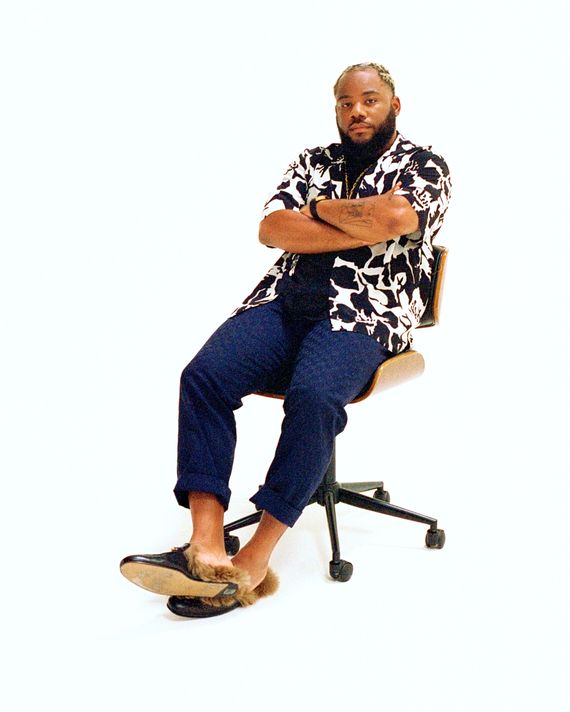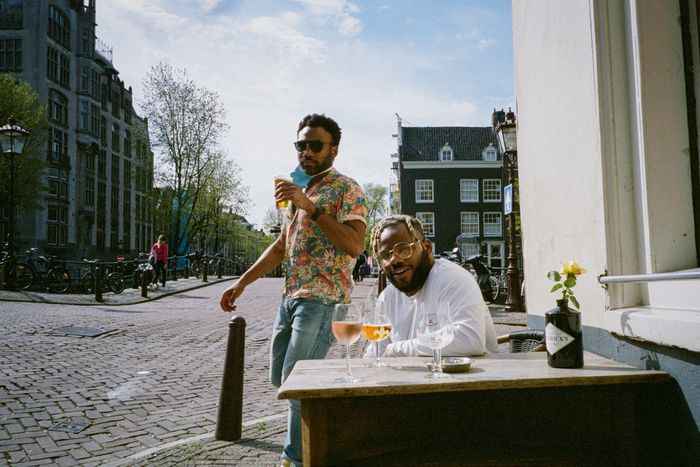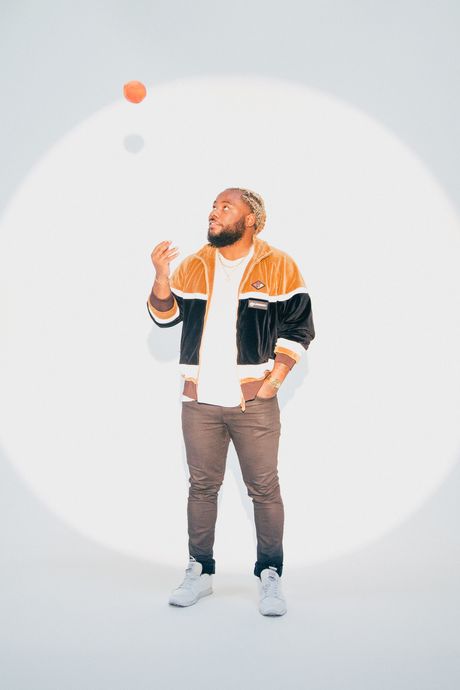
Stephen Glover shows up late to the interview in Gucci slacks and fur-fringed Gucci slides. “I gotta waste this money somehow,” he’ll half-jokingly tell me later. Straightaway, he mentions his vintage-car project and how expensive it’s been: “They’re a lot of work.” It feels almost like self-parody for someone like Glover, who calls himself “the funniest writer in the world, or at least America, but probably in the world, right now” — an introduction reminiscent of every trope of a (fairly) newly moneyed Black man in Hollywood. Except Glover, like the show he wrote for and executive-produced for six years, has a soft center and is much more interested in mulling over big ideas than bragging for bragging’s sake.
Prior to his senior year, the younger brother of Donald Glover left Georgia Tech, where he was studying chemical engineering, to help flesh out the TV idea that became Atlanta. The FX show about a local rapper named Paper Boi (Brian Tyree Henry) trying to make it, with help from his cousin-manager Earn (Donald) and stoner sidekick Darius (LaKeith Stanfield), would go on to win numerous awards, including six Emmys. As the series comes to a close Thursday night, it’s become a sort of cult classic, albeit a divisive one.
Season three turned a lot of viewers off with detours and stand-alone plots that took away from the core four characters (including Earn’s ex Van, played by Zazie Beetz). Its better fourth and final season continued to lean into the surreal, sometimes functioning as horror more than comedy, and won back critics and fans with episodes like a documentary-style meditation on the history of Disney’s A Goofy Movie, perhaps the Blackest animated movie ever made. We also see Paper Boi coming off a European tour and trying to make sense of his legacy as a rapper slowly aging out of the business; Earn is working on himself and in therapy. All the characters are getting older, and hopefully wiser, but one can’t be sure.
It’s a show that can be rewarding, if you make peace with its being a bit disjointed. The biggest idea Stephen Glover is now unpacking at its end is one he considers very simple: Yes, Atlanta meant to provoke you.
Into It
Subscribe on:
What genre would you use to classify Atlanta now that it’s complete?
It’s definitely a mix of things, but first and foremost it’s a comedy. The thing I’ve realized from doing four seasons of Atlanta is stuff I think is funny, some people might be like, “That’s terrifying.” Or, “That’s very sad.” In the writers’ room, we laughed at a ton of stuff, and the way we get to some of these ideas starts in a very dark place. I remember we saw a clip of a documentary about this service that goes around helping people who want to kill themselves, but of course they’re not allowed to do it. So it showed a lady going through this whole thing where she had to build a machine where a quadriplegic guy could flip a switch to kill himself. But she was also like, “I can’t be here when you do it.”
Oh, goodness.
It was very strange. But out of that came the Tupac death scene in season three. That’s how our minds work, mine especially. A lot of stuff that’s hilarious to me can be dark. But I think the comedy is easier to read in the scripts sometimes.
That’s one of the questions I have when I watch the show. There’s moments like, Oh, this is really, really, really smart. But I cannot tell if you want me to leave this episode doubled over in laughter or in tears. Some stuff speaks to the sad reality of racism in America, and you’re like, This is worth crying over. But also that was a punch line.
Well, even early on, I remember Donald was like, “This is the Black perspective. This is what it feels like to be Black.” If you’re Black, all you have to do is look at Twitter. Literally a nuclear bomb could go off tomorrow and people would be making jokes.
“Why was that bomb late?” Black as fuck.
Especially in the South, a lot of stuff, even though it’s bad — being Black, you have to laugh at it a little bit. So I get why people would be like, “This is heartbreaking.” Some of it is heartbreaking and sad. But the show is always based in humor.
Did you think about where viewers landed by the end of an episode? Because sometimes it feels like, Fuck a viewer. We want to piss you off. Deal.
Well, I think people get pissed off so easily now. There’s people who literally watch stuff to be pissed off, finding things to get mad about, which is stupid and makes TV and all art very unenjoyable. We’re not being provocative to get a reaction. We try to get into the gray areas of things. And you can’t really do that today. A lot of times, being in the gray area is the same as being an enemy.
I noticed because there was such a time gap between seasons two and three, people changed a little bit. Before, they would be like, “Oh, they’re talking about both sides and a nuanced discussion.” And then it became, like, “This is what they’re saying, and it’s one thing or the other.”
Did FX ever say, “Actually, no, you cannot make the death of a fake Tupac funny”?
FX rarely said, “You can’t do that.” But starting season three with an episode that did not have Darius, Earn, Paper Boi, or Van in it was very polarizing. They asked, “Are you sure about that?” And for good reason. Because they’re trying to make palatable network TV that can reach a mass audience and we’re trying to do something different. We’re trying to make interesting TV.
Are they two different things for you?
Yeah. They say people enjoy stories they already know the ending to more than stories they don’t, like a Top Gun. When I was younger, I always used to hate stuff where it’s like, “Oh no, Superman is about to die.” No, he’s not. Obviously not. I never felt like he was even close to dying.
Most people are into this archetypal hero’s journey. It seems as if the entire premise of Atlanta is rejecting that idea?
When thinking about Paper Boi’s ending, I feel very close to him. He definitely is my favorite character because he is complicated. And I think everybody either feels like Paper Boi or knows somebody like that: a guy who you would love to hang out with or be around, a good friend. And you’re kind of worried for what’s going to happen to him, but you want to see him pull through.
What’s a successful rapper’s journey? Most think of Jay-Z. But less than one percent of all rappers end up with a trajectory like that. So in asking where could Paper Boi journey’s end, you have to think about where you would want a real rapper’s journey to end. And when you think about rap, then you start to think about where you would want the culture’s journey to end or a Black person’s journey to end. Paper Boi’s struggle is very synonymous with a lot of Black people’s experience. Even though we’re not all rappers, we’re not all from the hood; everybody understands that story.
And the story is Black culture is an asset for Black people for a certain amount of time. Then it’s less attractive to the outside world, and what do you do next? Do you almost feel the same about yourself? You’re making this show that feels young, and Black, and fresh, but at some point the thing you’re doing is just less cool.
That’s definitely a theme in this season a lot. There’s youth culture in a lot of things, but when you sit and really think about it, it affects Black people the most. DMX is an incredible rapper, did a lot of incredible things, put out two albums in the same year that were super influential and great works. And then he ends up dying way too young and—
Halfway forgotten.
And it’s easy for people to be like, “Oh man, DMX was great.” Give him his flowers online and then move on. But the day the lead singer of The Who or something dies, there’s a much bigger …
There’s a path that it feels like the culture lays out for white creativity to sustain itself until death. That industry doesn’t do the same for Black people. And I feel that question being asked with Paper Boi. He can’t age out. In season four, he’s advised by this other, old Black rapper that he has to literally insert himself into a young white person as his avatar to continue to make it.
That’s the way that you’re taught to survive, the only way that seems viable. I think like that character, Bunk. He says something like, “Saving money is fine if you want to live a very mediocre, nice, but not extravagant life. But if you want to live this life you’re accustomed to, it costs money.” There’s this idea of you can’t go back, which is also terrifying to Black people. You’re seen as a screw up: “You had a golden ticket, and you blew it. And if I was you, I would’ve turned into Jay-Z.” Going in the opposite direction is not an option. So it makes you do all sorts of things, like get a Young White Avatar, that are against your integrity.
Have you done anything like that?
No, not yet. My goal isn’t to make the most money; it’s just to make enough money that I don’t have to do anything I don’t want to do. I remember Donald once said to me, “You’re not a Hollywood writer. They’ll try and fit you into that box so they can devalue you sometimes.” And then you realize you’re just a tool being used to write things for other people.
Was there a moment where you were most like “This could only have happened because the writers’ room was all Black”?
People really like the barbershop episode in season two, and I think that came from a barber that I have in Atlanta. (Shout out to Mister; his name is literally Mister.) All barbers have 17 jobs. They live such chaotic lives, and you want to get a haircut, and you’re willing to put up with a certain amount of shenanigans just because it’s worth it. And I think that’s a very Black idea. Some of the feelings we have in that episode could come only from Black people being in those spaces and feeling that way.
And not watering it down. It reminds me of an episode in the first season where there’s a whole interlude around lemon-pepper wings. And that only comes up with a Black writers’ room. Because if there were a white person in it, they’d be like, “Well, you have to explain it.” Oh no you don’t.
Very early on, we were like, “Man, we don’t want to be the show that’s explaining Black culture.” That was definitely a moment, like, “Wow, something that feels very normal to me, there’s a segment of people who have no idea what this means or what that is.”
Did y’all ever censor each other in a way that surprised you?
It’s funny — as we got toward season four, this is when the room became the biggest, and I remember there was a conversation about Earn being in therapy and us not wanting to discourage Black people from it. I was kind of like, “Oh, I don’t care about that.” But at the same time, I get the sentiment. When you’re a Black show, there’s always this responsibility that I think a lot of white shows don’t have.
A pressure to perform After School Specials. Tell these Black folks to eat their vegetables and go to therapy.
Or to be correct in some way. And I get that. There’s this idea of Black morality as a kind of crutch to Black people that’s interesting to me. I’m actually writing a movie that deals with it. Some of these ideas manifest themselves in season four.
What is the biggest question you hope viewers keep asking themselves that the show provoked?
What is interesting TV or film? What encompasses that? How do we decide what’s good and what we want out of the art and the ideas we’re getting? Do we want the same old thing? Do we want to be comfortable? Or do we want to try new things?
We’ve gotten criticism for stuff we’ve done that people don’t like, but we took those chances. I would hate for the next generation or the next great filmmaker to make boring shit just because he’s scared that he might get canceled. Hopefully people want to try new things and be weird. That’s the legacy.



